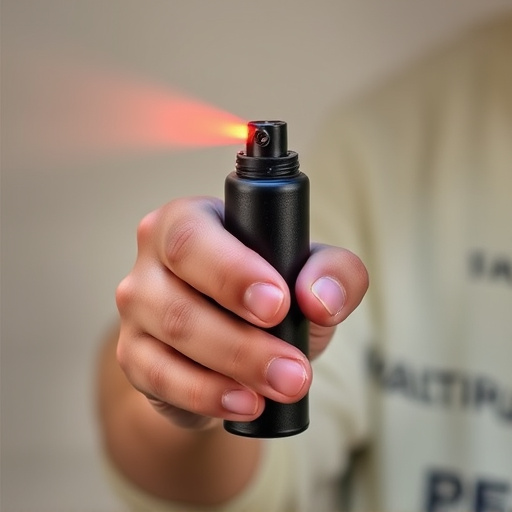The legal landscape surrounding pepper spray in the US varies greatly by state, with differing regulations on possession, use, and sale. Understanding these Pepper Spray Laws by State is crucial for responsible ownership and safe usage. Before purchasing, research local laws covering age restrictions, permit requirements, carrying permissions, and training mandates to ensure compliance and effectiveness in self-defense scenarios. Key considerations include spray range, weather resistance, ease of use, durability, weight, and size for reliable protection. Safe handling practices involve secure storage, regular maintenance, and proper application training.
“Uncover the power and importance of civilian defense pepper spray with our comprehensive guide. In today’s world, being prepared for unexpected situations is paramount. Understanding pepper spray goes beyond its impact; it involves navigating a complex legal landscape, varied state regulations (Pepper Spray Laws by State), and choosing the right product for your needs. From types to safety guidelines, this article ensures you’re equipped with knowledge, empowering you to make informed decisions regarding personal protection.”
- Understanding Pepper Spray: A Comprehensive Overview
- Legal Landscape: Pepper Spray Regulations by State
- Types of Pepper Spray for Civilian Use
- Factors to Consider When Choosing the Right Pepper Spray
- Responsible Ownership and Safety Guidelines
Understanding Pepper Spray: A Comprehensive Overview
Pepper spray, also known as oleoresin capsicum (OC) spray, is a non-lethal self-defense tool that has gained significant popularity among civilians for its ability to disable an attacker temporarily. This spicy chemical compound is derived from chili peppers and, when sprayed onto the face or eyes, causes intense pain, temporary blindness, and difficulty breathing, enabling the user to escape or seek help. Understanding pepper spray goes beyond its immediate effects; it also involves comprehending the legal framework surrounding its use, known as Pepper Spray Laws by State. Each state in the US has its own set of regulations governing the possession, use, and sale of pepper spray, varying widely in terms of permitted uses, restrictions on carrying, and minimum age requirements. Knowing these laws is essential for responsible pepper spray ownership and safe usage.
Legal Landscape: Pepper Spray Regulations by State
The legal landscape surrounding pepper spray in the United States is a patchwork of state-specific regulations, reflecting the varying perspectives on civilian self-defense. Pepper spray laws by state differ significantly, with some states allowing its use for self-defense without a permit, while others require users to obtain special licensing or registration. These variations are driven by differing priorities and public perceptions of personal safety and law enforcement.
Several states have enacted stringent regulations, limiting the availability and use of pepper spray. In these jurisdictions, strict age restrictions, waiting periods between purchase and possession, and mandatory training are common requirements. Conversely, some states have more permissive laws, allowing individuals to carry pepper spray without a permit as long as they meet certain safety standards. Understanding Pepper Spray Laws by State is crucial for citizens aiming to exercise their right to self-defense while adhering to local legal frameworks.
Types of Pepper Spray for Civilian Use
Civilian pepper spray is a popular self-defense tool, but understanding the different types and their legal standing in each state is crucial before making a purchase. The market offers various options tailored to specific needs, from compact carry sprays for everyday protection to powerful law enforcement-grade formulations. Each type has its unique features, such as occlusion levels, range, and duration of effects, which can significantly impact its effectiveness in real-world scenarios.
When considering pepper spray for civilian use, it’s essential to research Pepper Spray Laws by State. These laws dictate the legality, purchase requirements, and restrictions on carrying and using pepper spray. Some states allow civilians to carry pepper spray without a permit, while others mandate specific licenses or registrations. Understanding these regulations is vital to ensure compliance and maximize the safety benefits of owning a pepper spray device.
Factors to Consider When Choosing the Right Pepper Spray
When choosing a civilian defense pepper spray, several key factors come into play. Firstly, understand the local Pepper Spray Laws by State to ensure compliance and avoid legal issues. Different regions have varying restrictions on the type, capacity, and usage of pepper spray, so it’s crucial to research and select a product that aligns with these regulations.
Additionally, consider factors like spray range, effectiveness, ease of use, and durability. A good pepper spray should offer a safe yet effective distance for self-defense, reliable performance in various weather conditions, and a design that allows for quick deployment during distress situations. Weight and size are also important considerations for everyday carry or emergency preparedness kits.
Responsible Ownership and Safety Guidelines
Pepper spray, while a powerful tool for personal defense, requires responsible ownership and safe handling to ensure its effectiveness and minimize risks. It’s crucial to understand local Pepper Spray Laws by State before purchasing or carrying pepper spray. Different states have varying regulations regarding age restrictions, permit requirements, and public carrying permissions. Ignoring these laws can lead to legal consequences.
Safety guidelines include proper storage in a secure, child-proof location, keeping the spray out of reach of unauthorized individuals, and understanding the spray’s range and effectiveness. Regular maintenance, such as checking expiration dates and testing the spray’s functionality, is essential. Users should also be trained in its correct application to ensure they can deploy it effectively during an emergency while minimizing collateral damage and injury to bystanders.
In conclusion, pepper spray is a powerful personal defense tool for civilians, but its use comes with significant legal implications. Understanding the diverse Pepper Spray Laws by State and choosing the right product based on your needs and environment is essential. Always prioritize safety and responsible ownership to ensure you’re prepared without endangering others or facing legal repercussions.
